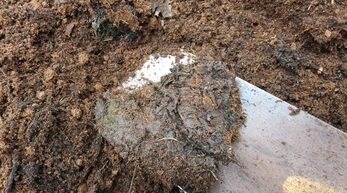AuthorLyn Chimera is a Master Gardener, consultant and lecturer. Archives
May 2023
Categories |
Back to Blog
Mulch, the Good and Not So Good6/1/2020  Most of us have heard about mulch but just what is it and why should you use it? First of all mulch is basically any material used to cover the bare surface of the soil. Nature has been mulching itself forever. Tree leaves and plants at the end of the season decompose on site and provide soil cover and nutrients for the next season. We have created controlled habitats in our gardens and have to provide this necessary process. There are multiple reasons to use mulch. The most common one people think of is to prevent weeds from growing. Who likes to spend the summer weeding?! However, other reasons are just as important if not more so; helping the soil retain moisture so you don’t have to water as much, keep the soil cooler which also cuts down on water evaporation and helps prevent cracking during dry periods, protect the soil from heavy rains and erosion, cut down on soil splashing up on the plants and lastly it gives the garden a finished look. The two main types of mulch are organic and inorganic. Organic simply means it’s made from plant or animal materials that have been ground or composted. Organic mulches will eventually decompose and add nutrients to the soil. Inorganic mulches include stone and plastic sheeting and have no value for the soil. Organic mulches are the best to use because along with all the ways they help your garden mentioned above they will also help improve the fertility of the soil as well as the structure of the soil making it easier for the roots to grow and easier for you to dig. As the organic mulch decomposes during the season it adds life to the soil through microorganisms. It’s these microorganisms that feed the plants. Most organic mulch consists of items like composted animal manure, leaves, straw, ground wood, sludge and yard and kitchen waste. Some of the most common mulches are made from chipped or ground wood, bark and branches. This is usually referred to as wood chips or bark mulch. In my opinion the large wood chip mulch is not the best option. It decomposes very slowly and adds little nutrient value to the soil. After a season or two it turns grey and the recommendation is to remove it and add fresh. Seems like a lot of expense and energy for mulch that is not that good at keeping weeds down. Triple ground wood mulch is a much better option. You will pay more but it’s more effective at weed control and will add nutrients to the soil as it decomposes. Cedar mulch has become popular because of the color however the cedars are being harvested from cedar bogs in the south at a frightening rate. For this reason alone I don’t recommend using it. Compost is a very affective mulch especially if you have “dirt” instead of good soil. Adding compost is the most effective way of improving your soil. When I started gardening my soil was heavy clay and almost impossible to dig. I mulched with compost for quite a few years and it made a huge difference. You can make your own or buy it by the bag or yard delivered to your driveway. A mixture of triple ground wood mulch and compost is ideal and available at many nurseries. Mulched leaves are an ideal and FREE mulch. To use as mulch the leaves have to be ground up using a mulching lawn mower. I collect mulched leaves people discard at the curb in the fall and bag them for later use. They make a light weight (no back breaking shoveling of heavy mulch) excellent mulch. I use mulched leaves exclusively now except for one bed in the front which gets a lot of wind. Mulches to avoid are the non-organic varieties. Stone mulch is not recommended. It’s heavy, expensive, doesn’t improve the soil, increases watering needs and is an ineffective weed barrier. It also absorbs heat which can be harmful to some plants and causes the water in the soil to evaporate faster. Plastic garden or weed barrier is also a very poor choice. You need to cover it with mulch to hold it down and it tends to migrate and show up above the soil after a while. Plastic weed cloth is also very hard to plant through and when weeds do show up are hard to remove. Bottom line… use an organic mulch that includes some compost. It will make your gardening much easier and improve the soil at the same time. A win/win situation!
1 Comment
Read More
judith s wieserner
8/9/2020 11:15:32 pm
My favorite after 50 years of gardening is Red Cedar mulch produced in Canada. It looks sharp and smells soooo good!!
Reply
Leave a Reply. |

 RSS Feed
RSS Feed
